有关于五官英语习语共22页
与人体部位相关的英语习语3
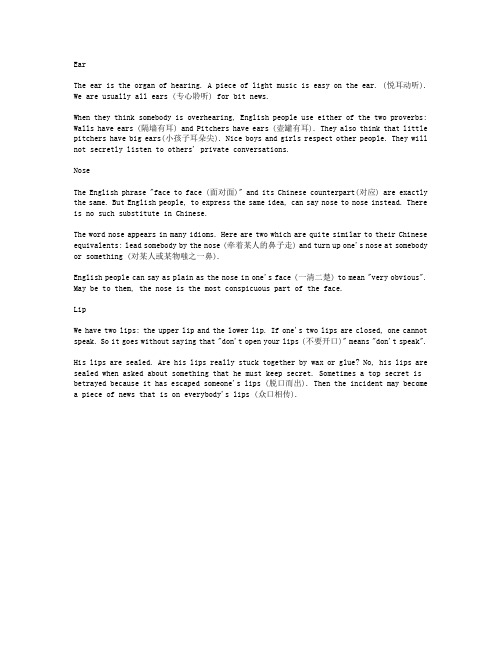
EarThe ear is the organ of hearing. A piece of light music is easy on the ear. (悦耳动听). We are usually all ears (专心聆听) for bit news.When they think somebody is overhearing, English people use either of the two proverbs: Walls have ears (隔墙有耳) and Pitchers have ears (壶罐有耳). They also think that little pitchers have big ears(小孩子耳朵尖). Nice boys and girls respect other people. They will not secretly listen to others' private conversations.NoseThe English phrase "face to face (面对面)" and its Chinese counterpart(对应) are exactly the same. But English people, to express the same idea, can say nose to nose instead. There is no such substitute in Chinese.The word nose appears in many idioms. Here are two which are quite similar to their Chinese equivalents: lead somebody by the nose (牵着某人的鼻子走) and turn up one's nose at somebody or something (对某人或某物嗤之一鼻).English people can say as plain as the nose in one's face (一清二楚) to mean "very obvious". May be to them, the nose is the most conspicuous part of the face.LipWe have two lips: the upper lip and the lower lip. If one's two lips are closed, one cannot speak. So it goes without saying that "don't open your lips (不要开口)" means "don't speak".His lips are sealed. Are his lips really stuck together by wax or glue? No, his lips are sealed when asked about something that he must keep secret. Sometimes a top secret is betrayed because it has escaped someone's lips (脱口而出). Then the incident may become a piece of news that is on everybody's lips (众口相传).。
人体部位和英语习语_1
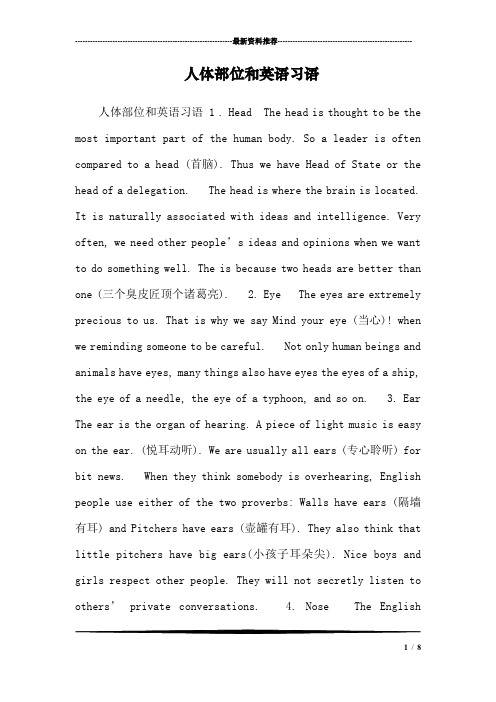
---------------------------------------------------------------最新资料推荐------------------------------------------------------人体部位和英语习语人体部位和英语习语 1 . Head The head is thought to be the most important part of the human body. So a leader is often compared to a head (首脑). Thus we have Head of State or the head of a delegation. The head is where the brain is located.It is naturally associated with ideas and intelligence. Very often, we need other people’s ideas and opinions when we want to do something well. The is because two heads are better than one (三个臭皮匠顶个诸葛亮). 2. Eye The eyes are extremely precious to us. That is why we say Mind your eye (当心)! when we reminding someone to be careful. Not only human beings and animals have eyes, many things also have eyes the eyes of a ship, the eye of a needle, the eye of a typhoon, and so on. 3. Ear The ear is the organ of hearing. A piece of light music is easy on the ear. (悦耳动听). We are usually all ears (专心聆听) for bit news. When they think somebody is overhearing, English people use either of the two proverbs: Walls have ears (隔墙有耳) and Pitchers have ears (壶罐有耳). They also think that little pitchers have big ears(小孩子耳朵尖). Nice boys and girls respect other people. They will not secretly listen to others’ private conversations. 4. Nose The English1/ 8phrase face to face (面对面) and its Chinese counterpart(对应) are exactly the same. But English people, to express the same idea, can say nose to nose instead. There is no such substitute in Chinese. The word nose appears in many idioms. Here are two which are quite similar to their Chinese equivalents: lead somebody by the nose (牵着某人的鼻子走) and turn up one’s nose at somebody or something (对某人或某物嗤之一鼻). English people can say as plain as the nose in one’s face (一清二楚) to mean very obvious. May be to them, the nose is the most conspicuous part of the face. 5. Lip We have two lips: the upper lip and the lower lip. If one’s two lips are closed, one cannot speak. So it goes without saying that don’t open your lips (不要开口) means don’t speak. His lips are sealed. Are his lips really stuck together by wax or glue? No, his lips are sealed when asked about something that he must keep secret. Sometimes a top secret is betrayed because it has escaped someone’s lips (脱口而出). Then the incident may become a piece of news that is on everybody’s lips (众口相传). 6. Tongue We all know we cannot speak without the tongue. So the tongue is closely related to speech. To hold one’s tongue (保持沉默) means to keep silent. A person who has too much tongue (太多嘴) is disliked by all, for he is too---------------------------------------------------------------最新资料推荐------------------------------------------------------ talkative. Mother tongue is not the tongue of a mother: it is a per son’s native language. Don’t you have a moth below your nose (你鼻子底下不是有张嘴吗)? The Chinese say so to blame a person who did not say what he should have said. But this not the right way to express the idea in English. English people would say, You have a ton gue in your head, haven’t you? 7. Face Face has to do with the idea of respect and dignity both in Chinese and English. You lose your face (丢面子) if you fail again and again, but a decisive victory will save your face (挽回面子) after all your failures. When you feel unhappy, you pull a long face (拉长脸). The idea is conveyed in Chinese in the same way. But about face (向后转) does not refer to the face. It is a military order to turn round and face in the opposite direction. It is the exact equivalent of about turn. 8. Shoulder The shoulders can bear heavy things. Your father has a great responsibility for the family on his shoulder. When faced with difficulty, the family should stand shoulder to shoulder (肩并肩) to overcome it. You should not turn a cold shoulder (不理睬) to your family members. Nor should you give your friends the cold shoulder (冷落朋友). Both expressions mean treating others coldly. 9. Back A good host is3/ 8hospitable to his guests. But, if guest is tiresome, the hostis glad to see his back (他离开). If your friend has done something really well, you may give him a pat on the back (轻轻拍背部) to show your appreciation. If you turn your backon somebody (不理睬他人), you mean you do not like making friends with that person. 1 0. Heart The heart is an extremely important organ inside the chest. It usually standsfor something important or the centre of something, for example, the heart of the matter (问题的核心) or the heart of mystery. Many other expressions make use of the word heart. A lover canbe called a sweet heart (情人). The Purple Heart (紫心徽章) isa medal given as an honor to American soldiers wounded in battle. If your friend is in trouble, you may encourage him by saying Don’t lose heart (不要灰心). 1 1 . Stomach The stomach is naturally relat ed to one’s appetite. If you dislike heavy food, you have no stomach for it (反胃). The word is also related to one’s interests or likings. If you find something boring or vulgar, you have no stomach for it, either. Bad food turns your stomach. Similarly, your stomach turns at a bad joke. Stomach can also be a verb. Look at this example: How could you stomach (忍受) such rude words? Apparently, stomach here can be replaced by tolerate. 1 2. Arm Every person has two arms:---------------------------------------------------------------最新资料推荐------------------------------------------------------the right arm and the left arm. The right arm is usually stronger, so we call a good helper the right arm (得力助手). We all know an arm is not very long. But when you keep someone at arm’s length (保持距离), the distance is long enough. For that means you don not like that person and you try your best to avoid him or her. We should indeed keep the bad friends at arm’s length.1 3. Hand Quite a number of phrases formed form the word hand are very similar to their Chinese counterparts. Here are some obvious examples: a fresh hand (新手), short of hands (人手短缺), hand in hand (手拉手) and wash one’s hands of something (洗手不干了). But do not always take this for granted. Study these examples and you will understand. He lives from hand to mouth (He has just enough money to live on). We gave them a big hand (We gave them lots of applause). 1 4. Finger How many fingers does each of your hands have? Now let’s name them in English from the smallest: the little finger, the ring finger, the middle finger, the index finger and thumb. Each finger has its own part to play. If your fingers are all thumbs (笨拙), that is too bad. That means you are very clumsy. 1 5. Thumb Chinese people turn up their thumbs to express appreciation. English people do so to express not only5/ 8appreciation but also approval. Chinese people never turn their thumbs down to mean anything. But English people do. They do so to show depreciation disapproval. Thus in English you can say, We turn thumbs up (赞成) to Jack’s suggestion but they turn thumbs down (不赞成) to it. Similarly, you can warmly praise someone by saying Thumbs up (真棒)! and show your dissatisfaction by saying Thumbs down (差劲)! 1 6. Nail If you see two of your classmates fighting tooth and nail (又抓又咬), you must stop them at once. Otherwise, at least one of them would be hurt. Nail also means a thin pointed piece of metal for hammering into something. But it is related to the body in this sentence: Peter is as hard as nails (结实的象铁打的). We all hope that we are as strong and healthy as he is. Then if I say you have hit the nail on the head (中肯,一针见血), I don not mean that you have done something cruel. I mean that you have said exactly the right thing. 1 7. Leg The word leg appears in many colloquial expressions. At a party, when you feel like dancing, you can say to a good friend of yours, Let’s shake a leg. Obviously, it means Let’s dance. When you want your fiend to hurry, you can also shake a leg. In American English it means hurry. The arms and legs are very important to us. Therefore when asked why you are not going to buy---------------------------------------------------------------最新资料推荐------------------------------------------------------ something expensive, you may answer, It costs an arm and a leg! You mean that it is really expensive. If you pull one’s leg, it means you make fun of someone. 1 8. Toe To convey the idea from head to foot, English people san say from top to toe. But Chinese people don’t. Some people turn their toes out (八字脚) when they walk. Some turn their toes in. When faced with danger, we must be alert and ready for action, that is to say, we must be on our toes (保持警惕). 1 9. Skin Human beings have skin. So have animals and plants. The skin can be think or thin. A think-skinned person, or a person who has a thin skin, is easily upset or offended while a thick-skinned person, or a person who has a think skin, is quite the contrary. Both expressions are sometimes derogatory (贬义). That is to say, sometimes the former refers to a person who is too sensitive; the latter a person who has little sense of shame.20. Hair Most people will only think of the hair on our head when the word hair is mentioned. In fact, some animals and plants also have hair. A horrible scene may make a person’s hair stand on end (毛骨悚然). But a courageous person will not turn a hair (不畏惧) even though he is in face of danger. Sometimes, a friend of yours may be so angry that he may act7/ 8foolishly. Then you had better give him this advice: Keep your hair on (别发脾气).。
有关于五官的英语习语

to n g u e
smite with the tongue
血口喷人
Don't offend her. She always smites with the tongue.
千万别得罪她,她经常血口喷人
tongue-lashing
狠狠训斥
When I was ten years old, mother caught me smoking a cigarette in the backyard. She gave me such a tongue-lashing that I've never touched another cigarette all my life.
我在家里碰上麻烦了。我昨晚叫错了太太的名字,我叫她 "Susan",而她的 名字是 "Betty"。 Susan是我以前的女朋友。这实在只是个口误,但是Betty却 光火得再也不理我
Don't trust the guy. He usually speaks with a forked tongue
wet behind the ears 乳臭未干 behind the ears 直译的话,意思是:耳朵背后是潮 的。这个习惯用语从20世纪早期开始在报刊杂志中 出现,而在此之前,这一说法已经被人们广泛使用 了。 这个习语源于这样的说法:胎生动物,如马、牛、 羊刚生下来的时候全身湿漉漉的;别的地方很快会 干,但是耳朵背后却还是湿的。所以说某人耳朵背 后是潮的,是比喻这人还没有真正长大,太年轻, 缺 乏人生经验。英文注释是:If someone is wet behind the ears, they don't have much experience of life.
有关人体身体部位的英文谚语习语
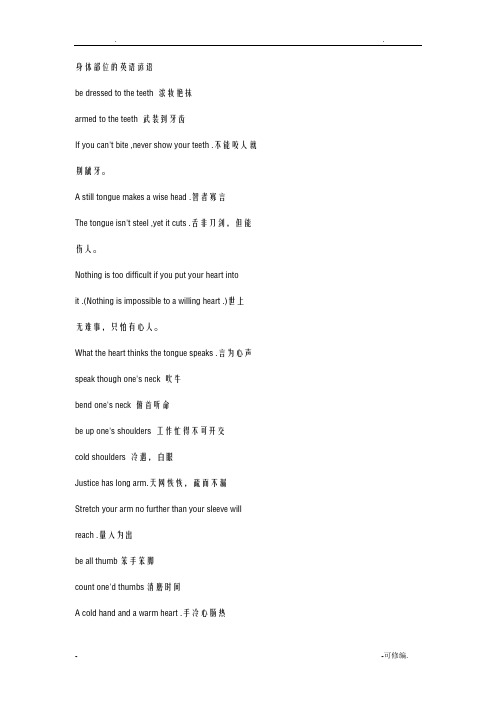
身体部位的英语谚语be dressed to the teeth 浓妆艳抹armed to the teeth 武装到牙齿If you can't bite ,never show your teeth .不能咬人就别龇牙。
A still tongue makes a wise head .智者寡言The tongue isn't steel ,yet it cuts .舌非刀剑,但能伤人。
Nothing is too difficult if you put your heart intoit .(Nothing is impossible to a willing heart .)世上无难事,只怕有心人。
What the heart thinks the tongue speaks .言为心声speak though one's neck 吹牛bend one's neck 俯首听命be up one's shoulders 工作忙得不可开交cold shoulders 冷遇,白眼Justice has long arm.天网恢恢,疏而不漏Stretch your arm no further than your sleeve will reach .量入为出be all thumb笨手笨脚count one'd thumbs消磨时间A cold hand and a warm heart .手冷心肠热One hand washes another .有来有往;互相利用fall on one's leg逢凶化吉as fast as one'd legs can carry one 开足马力,拼命跑across one's knee(把小孩)脸朝下放在膝盖上打屁股beat sb to his knees打败某人have a foot in both camps脚踏两只船Better the foot slip than the tongue (Better to slipwith the tongue )宁可失足,不可失言。
与nose和ear有关的习语
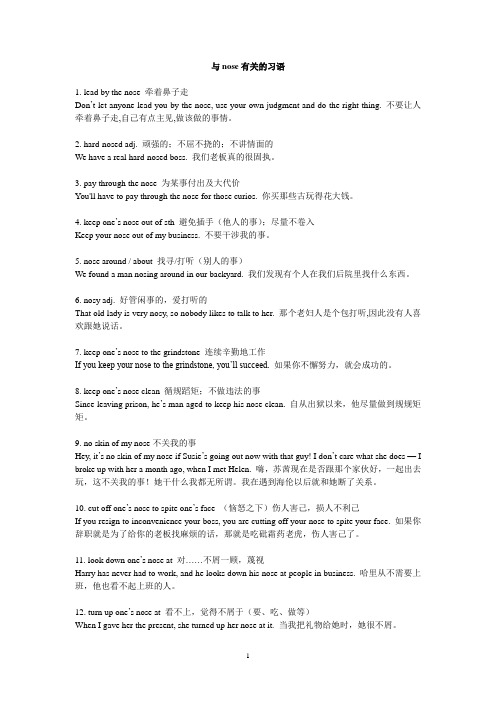
与nose有关的习语1. lead by the nose 牵着鼻子走Don’t let anyone lead you by the nose, use your own judgment and do the right thing. 不要让人牵着鼻子走,自己有点主见,做该做的事情。
2. hard-nosed adj. 顽强的;不屈不挠的;不讲情面的We have a real hard-nosed boss. 我们老板真的很固执。
3. pay through the nose 为某事付出及大代价You'll have to pay through the nose for those curios. 你买那些古玩得花大钱。
4. keep one’s nose out of sth 避免插手(他人的事);尽量不卷入Keep your nose out of my business. 不要干涉我的事。
5. nose around / about 找寻/打听(别人的事)We found a man nosing around in our backyard. 我们发现有个人在我们后院里找什么东西。
6. nosy adj. 好管闲事的,爱打听的That old lady is very nosy, so nobody likes to talk to her. 那个老妇人是个包打听,因此没有人喜欢跟她说话。
7. keep one’s nose to the grindstone 连续辛勤地工作If you keep your nose to the grindstone, you’ll succeed.如果你不懈努力,就会成功的。
8. keep one’s nose clean 循规蹈矩;不做违法的事Since leaving prison, he’s man-aged to keep his nose clean. 自从出狱以来,他尽量做到规规矩矩。
有关人体身体部位的英文谚语习语
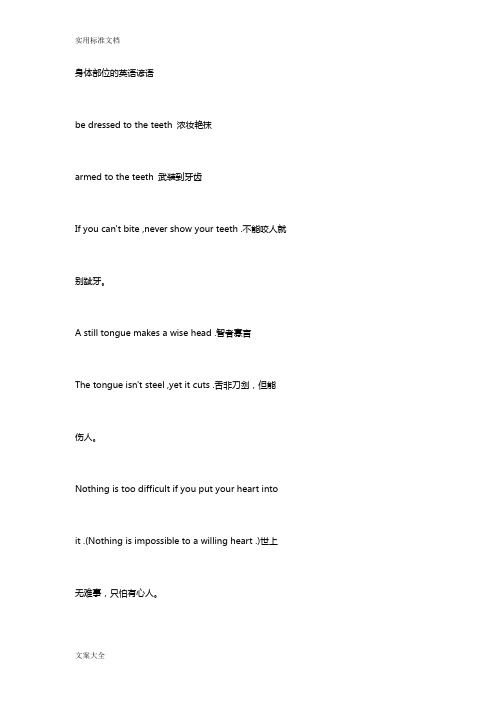
身体部位的英语谚语be dressed to the teeth 浓妆艳抹armed to the teeth 武装到牙齿If you can't bite ,never show your teeth .不能咬人就别龇牙。
A still tongue makes a wise head .智者寡言The tongue isn't steel ,yet it cuts .舌非刀剑,但能伤人。
Nothing is too difficult if you put your heart into it .(Nothing is impossible to a willing heart .)世上无难事,只怕有心人。
What the heart thinks the tongue speaks .言为心声speak though one's neck 吹牛bend one's neck 俯首听命be up one's shoulders 工作忙得不可开交cold shoulders 冷遇,白眼Justice has long arm.天网恢恢,疏而不漏Stretch your arm no further than your sleeve will reach .量入为出be all thumb笨手笨脚count one'd thumbs消磨时间A cold hand and a warm heart .手冷心肠热One hand washes another .有来有往;互相利用fall on one's leg逢凶化吉as fast as one'd legs can carry one 开足马力,拼命跑across one's knee(把小孩)脸朝下放在膝盖上打屁股beat sb to his knees打败某人have a foot in both camps脚踏两只船Better the foot slip than the tongue (Better to slip with the tongue )宁可失足,不可失言。
与身体部位有关的习语
与身体部位有关的习语汉语中有许多习语都和身体部位有关,英语也不例外,下面一些例子供大家参考。
1. An eye for eye, a tooth for tooth.以眼还眼,以牙还牙。
例如:A: Are you going to tell John’s supervisor what he did?B: Sure. He told my supervisor when I did the same thing.A: An eye for eye, a tooth for tooth.此句源自《汉莫拉比法典》,指用对方做事的同样方法来报复。
这与汉语中的说法十分相似,很好理解。
2. get cold feet 胆怯;例如:A: What happened to Jim? I thought he would go skydiving with us.B: He got cold feet.有人会因为脚浸入海水觉得冷而放弃游泳,“get cold feet”由“脚变凉“而转到“胆怯”之意,十分形象。
3. I need that like I need a hole in my head.完全不需要。
例如:A: I’m having a hard time deciding what car to get.B: Look at this one. Why not buy it?A: I need that like I need a hole in my head.在头上除了眼,鼻,口之外,不需要别的“洞”了,因此就转为“完全不需要”的意思。
此句生动有趣,在口语中运用一下很不错哦!4. It’s as plain as the nose on your face.很明白,很清楚。
例如:A: Do you think Nancy is going to quit? She hasn’t said anything.B: It’s as plain as the nose on your face.直译为“就像看你脸上的鼻子一样,我看得很清楚。
【仁爱英语 七年级上册】课外补充:人体部位英语谚语
课外补充:人体部位英语谚语在我们中国有“失之交臂”、“交头接耳”、“一时失足”等与人体部位有关的成语、谚语。
在英语中也有许多关于人体部位的习语、谚语。
下面就“从头到脚”开始学起。
1.head 头Two heads are better than one.两人智慧胜一人。
(三个臭皮匠,赛过诸葛亮。
)Better be the head of an ass than the tail of a horse.宁为鸡头,不当凤尾。
2.hair头发Take a hair of the dog that bit you.以毒攻毒;以酒解酒。
3.eye眼;目Four eyes see more than two .两个人总比一个人看得全面。
4.face脸;面孔A good fame is better than a good face.美名胜过美貌。
A good face is a letter of recommendation .漂亮的脸蛋就是最好的介绍信。
5.nose鼻子1See no further than one’s nose.鼠目寸光。
6.mouth 嘴;口Keep your mouth shut and your eyes open.多看少说。
7.tooth 牙齿Be dressed to the teeth.浓妆艳抹。
8.heart心;心脏Nothing is too difficult if you put your heart into it.世上无难事,只怕有心人。
9.arm臂,胳膊Justice has long arms.天网恢恢,疏而不漏。
10.h and 手One hand washes another.有来有往,互相利用。
11.l eg腿;腿部Fall on your leg.逢凶化吉。
12.f oot 脚,足Have a foot in both camps.脚踏两只船。
2旗开得胜Better the foot slip than the tongue.宁可失足,不可失言。
趣谈与五官相关的英语习语
提醒别人要小心时 , 我们说 :Midyu e 当你 不愿意注 “ n r y !” o e
意一样东西时 , toe o r yso t 。相反的 , 你“,s u e t i” 2 y e l 你要 “ep ke
a e0 ” ne 1i 。如 果你要请人认 清事实 ,可 叫他 “pnyu y 3t oe or
h a n a s n d b . e da d e r e t i ”
英语 习语语 言是文化的载体 , 又是 语言的精华 , 经过 是 长时 间的使 用而提炼出来 的固定 短语或短 句 ,反映着 最普
3 鼻子
鼻子一词 出现在许 多习语 中 ,当一个人受 人影响或控 制时, 就是被拉着鼻子走 :l yh Oe 。在现代社会 里 , “e b e S” d t n
1眼 睛
眼睛对我们来说是 非常宝 贵的 ,这就是 为什么 当我们
4 舌 头
我们都 知道 , 说话 不能没有舌 头 。因此 , 舌头 与说话 可 以说是 密不 可分 的。T o n ’t ge的意思是 “ o l oe nu hd so 保持沉 默 ”一个人 “a o c n u ” , hso ht ge 是没有 人会 喜欢的 , t mu o 因为他 太爱说话 ; ohrog e M tetnu 不是母亲 的舌 头 ,它是一个人的母 语 。“ o ’ o aea u e wyu oe” 国人 这样说 D nt uhv t b l r s? 中 y mo h o o n 是责怪一个人不开 口说他应该说 的。但 是 , 英语人不这样表 达 ,这种 情况 下他 们会 说 :Y uhv nu or ed “ o aea og e nyu a , t i h
英语讲义【121】与五官有关的动词短语
上⼀期谈到与五官有关的惯⽤语中不少是动词短语或习语。
这⾥就把那些时常会⽤到的举出来参考。
1. Close/Shut one's ears to……: 不听(坏的或不愉快的东西)。
“I am one of those who often shut their ears to gossips.” 2. Keep one's ear to the ground: 确定会发⽣的事。
“You may not know every happening , but you must keep your ear to the ground.” 3. Turn a deaf ear to……: 对…充⽿不闻 .“As Ben does not respect Jean, he often turns a deaf ear to what she has said.” 4. Clap eyes on……: 惊奇地看。
“I have never clapped eyes on such a funny person before.” 5. Catch one's eye: 引起注意。
“Noelle was reading. All of a sudden, something strange caught her eye.” 6. Can't take one's eyes off……: 禁不住地看。
“The girl going past the crowd was so attractive that the people could not take their eyes off her.” 7. Keep one's eyes open/ peeled (for……): 注意… “When on a country road, the picnickers kept their eyes peeled fora campsite.” 8. Bring someone face to face with……: 必须⾯对不愉快的… “The rich man was brought face to face with his only son's poor performance in school work.” 9. Lose face: 丢脸。
